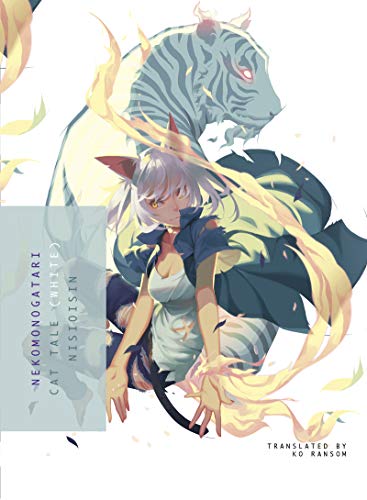-
NEKOMONOGATARI
NISIOISIN
(Vertical, Dec. 8, 2017)Following up on the high note of family ties on which the previous installment concluded, but preceding it chronologically, we find Araragi and his little sister Tsukihi, the heroine of the last volume, in full sibling rivalry mode as they bicker about love. The conversation that cannot end unfolds in its unabashed original glory herein. Like KIZUMONOGATARI, which delved into our narrator’s disastrous spring break, Cat Tale (Black) is a prequel about another catastrophe, mentioned often yet never recounted even in a foregoing chapter dedicated to Miss H.: namely, the model student’s rampage over Golden Week, a string of holidays starting at the end of April. Closing out what has come to be known as the “First Season” of the series, this episode of ’GATARI, as rich as ever in silly banter and poignant profundities, richer than usual in snide meta comments about the anime, will make you laugh and cry, or just put a grownup smile on your face, maybe, but is guaranteed to stay with you forever.
-
NEKOMONOGATARI
NISIOISIN
(Vertical, Feb. 27, 2018)Launching into new territory that the author hadn’t mapped out when he embarked on the series, NEKOMONOGATARI (White) tells the tale of heroine Tsubasa Hanekawa from her own perspective, in her own voice—if that can hold true for a damaged soul who, depending on who you’re asking, suffers from a split personality or a supernatural aberration.The bone-chilling brokenness of her household, where father and mother and daughter keep three separate sets of cookware in the same kitchen and only ever prepare their own meals, and the profound darkness nurtured in the genius schoolgirl’s heart, come to life, if that is the word, through her self-vivisection. As for our customary unreliable narrator, Araragi, we seem to learn revealing tidbits about him now that we have an outside view of him at last, while his lady friends Senjogahara, Hachikuji, et al, freed from his predilection for proudly inane banter, show subtly new faces to us via their female interlocutor. Welcome to the Second Season.
-
NEKOMONOGATARI
NISIOISIN, VOFAN
language (KODANSHA, Oct. 8, 2019)Launching into new territory that the author hadn’t mapped out when he embarked on the series, NEKOMONOGATARI (White) tells the tale of heroine Tsubasa Hanekawa from her own perspective, in her own voice—if that can hold true for a damaged soul who, depending on who you’re asking, suffers from a split personality or a supernatural aberration.The bone-chilling brokenness of her household, where father and mother and daughter keep three separate sets of cookware in the same kitchen and only ever prepare their own meals, and the profound darkness nurtured in the genius schoolgirl’s heart, come to life, if that is the word, through her self-vivisection.As for our customary unreliable narrator, Araragi, we seem to learn revealing tidbits about him now that we have an outside view of him at last, while his lady friends Senjogahara, Hachikuji, et al, freed from his predilection for proudly inane banter, show subtly new faces to us via their female interlocutor. Welcome to the Second Season.
-
NEKOMONOGATARI
Illustrated by VOFAN NISIOISIN
language (VERTICAL, June 5, 2019)Following up on the high note of family ties on which the previous installment concluded, but preceding it chronologically, we find Araragi and his little sister Tsukihi, the heroine of the last volume, in full sibling rivalry mode as they bicker about love. The conversation that cannot end unfolds in its unabashed original glory herein. Like KIZUMONOGATARI, which delved into our narrator’s disastrous spring break, Cat Tale (Black) is a prequel about another catastrophe, mentioned often yet never recounted even in a foregoing chapter dedicated to Miss H.: namely, the model student’s rampage over Golden Week, a string of holidays starting at the end of April. Closing out what has come to be known as the “First Season” of the series, this episode of ’GATARI, as rich as ever in silly banter and poignant profundities, richer than usual in snide meta comments about the anime, will make you laugh and cry, or just put a grownup smile on your face, maybe, but is guaranteed to stay with you forever.
-
Nekomonogatari
Nisioisin, Cristina Vee, Eric Kimerer, Erica Mendez, Random House Audio
Audiobook (Random House Audio, April 9, 2019)Launching into new territory that the author hadn’t mapped out when he embarked on the series, Nekomonogatari (White) tells the tale of heroine Tsubasa Hanekawa from her own perspective, in her own voice - if that can hold true for a damaged soul who, depending on who you’re asking, suffers from a split personality or a supernatural aberration. The bone-chilling brokenness of her household, where father and mother and daughter keep three separate sets of cookware in the same kitchen and only ever prepare their own meals, and the profound darkness nurtured in the genius schoolgirl’s heart, come to life, if that is the word, through her self-vivisection. As for our customary unreliable narrator, Araragi, we seem to learn revealing tidbits about him now that we have an outside view of him at last, while his lady friends Senjogahara, Hachikuji, et al, freed from his predilection for proudly inane banter, show subtly new faces to us via their female interlocutor. Welcome to the second season.